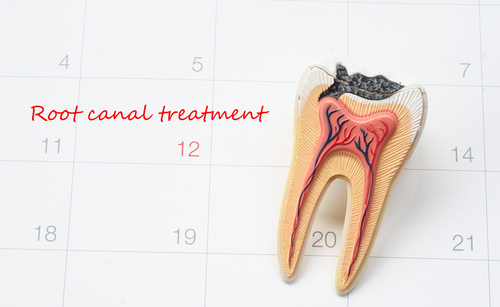A root canal is a wonderful remedy to save a tooth from extraction or infection. Most people don’t realize it is no more uncomfortable or difficult than a traditional tooth filling! If you had a recent root canal, you are on your way to restoring your oral health. There are a few key things you can do to care for your root canal tooth for long-term success.
Medication management
Initially following your root canal, you may feel numb from the local anesthetic. It is expected to feel soreness around the tooth, especially if you had recent trauma or an infected tooth from decay. While these symptoms are only temporary, your dental office in Mira Mesa, San Diego may recommend medication to help manage your discomfort. Common medications recommended include:
- Over-the-counter pain medication: Acetaminophen and Ibuprofen are commonly recommended medications for pain and swelling. Speak with your dentist to ensure they are right for you.
- Antibiotic: If you had a recent infection, your dentist may prescribe an antibiotic to prevent the spread of infection.
- Mouthrinse: Sometimes an antibacterial or antiseptic mouthrinse is beneficial because it can help decrease chances of infection and helps you maintain good oral hygiene. Using a warm salt rinse is recommended because salt inhibits dental bacteria and promotes healing.
Food restriction
A recent root canaled tooth may be sensitive and it is important to avoid chewing or biting on hard, crunchy foods. If a tooth is not restored with a dental crown or filling, it is more susceptible to fracturing and causing serious dental problems. Avoid eating sticky foods until a tooth is fully restored.
It is best to avoid chewing too much soon after your root canal procedure because you will likely be numb from your treatment. Eating before numbness wears off can cause you to unknowingly bite your tongue, lip, or cheek and cause pain and ulceration.
Eat foods that are healthy and soft like banana, pasta, eggs, and soft vegetables until your tooth is restored. This will eliminate unnecessary pressure on your tooth.
Proper oral hygiene
Your tooth may have needed a root canal from a recent trauma or from a failed previous restoration. A majority of teeth need root canals because of deep tooth decay that is caused by poor brushing and flossing habits.
If you had a root canal in Mira Mesa, San Diego, you need to care for your treated tooth and the rest of your oral cavity by maintaining a good routine. Brush with a soft bristled toothbrush twice daily. Floss to avoid gum irritation and food trapping between teeth. While you need to brush gently around your root canal tooth, there is no reason to avoid routine brushing and flossing.
You can also rinse with an antibacterial rinse to help reduce your chances of infection and gum irritation after your root canal. This in addition to flossing and brushing can help dislodge food and plaque trapped between teeth.
Avoid alcohol and tobacco products
If you just had a root canal, it is wise to avoid products that can harm your newly treated tooth. A root canal procedure makes your tooth and gum more vulnerable to infection right after the procedure. Consuming alcohol and using tobacco products can delay wound healing.
Visit your dentist
After your tooth gets a root canal, it is susceptible to fracturing because it needs a new support system. It is very important to follow up with your dentist to discuss restorative options like a crown or bridge. Leaving a root canal tooth without a restoration is likely to fail and cause pain in the future. Also remember that you invested time, finances, and your health into your root canal treatment so you don’t want to compromise this tooth.
If you experience any issues like facial swelling, allergic reaction, or severe pain, you want to contact your dentist for an emergency visit. You should not ignore severe symptoms as they could indicate an infection and require assistance.
Complications to watch for
A root canal is a routine dental procedure and very rarely has any complications. Most are successful, but there are some possible complications that can arise. If you have pain after your procedure, it could be because a canal was untreated or the sealant material used to close up your tooth broke down. Any compromise to a root canal tooth following the procedure can allow bacteria to reach inside and cause further infection.
Sometimes there is a crack in a tooth that is very difficult to diagnose. If you have unusual symptoms following your root canal in San Diego, be sure to notify your dentist.
Remember that a root canal has many benefits to restore your oral health and maintain your natural tooth for several years. The majority of people return their regular activities the very next day.

